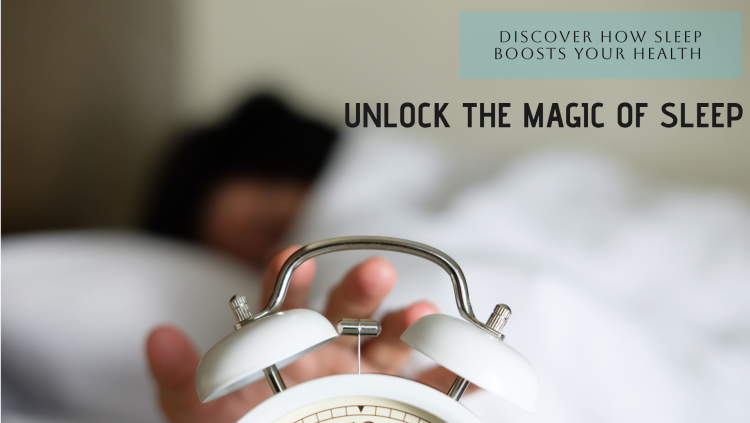The Magic of Sleep: How Sleep Boosts Your Health
Sleep can often feel like a luxury when we are managing busy schedules and endless to-do lists. But here’s the truth: sleep is one of the most powerful tools for improving our health. Let us look at the science and see why getting enough rest is essential for everything from heart health to overall happiness..
Sleep for Sharper Thinking and Memory: It’s Like Brain Food!
Did you know that sleep boosts your learning capacity by a whopping 40%? Studies show that during REM sleep (that deep, dreamy stage), your brain organizes and stores information. Pulling all-nighters actually cuts your ability to form memories by up to 50%
Mood Matters: Good Sleep Boosts Your Mood by 60%
A single bad night of sleep can make you feel 60% more emotionally reactive, turning a minor annoyance into a major frustration. But good sleep helps your brain process emotions better, lowering levels of stress hormones like cortisol and boosting mood-enhancing chemicals like serotonin. People who get adequate sleep are 30% less likely to experience depression and 45% less likely to develop anxiety over time.
Immune System Support: Get Sick Less Often with Solid Sleep
Sleeping 7–8 hours a night can boost immune function by 30% and help you stay healthy during flu season. Studies show that those who get fewer than 5 hours of sleep per night are nearly 3 times more likely to catch a cold! During deep sleep, your body produces infection-fighting proteins called cytokines, helping you fend off everything from colds to more serious conditions.
Metabolism & Weight Control: 55% More Likely to Keep a Healthy Weight
Lack of sleep disturbs your hunger hormones , boosting ghrelin (the hunger hormone) by 15% and dropping leptin (the fullness hormone) by 15%. Sleep-deprived people are 55% more likely to become obese, and regularly getting 7+ hours of sleep can reduce your risk of weight gain by 30%!
Heart Health: Sleep is a Secret Weapon for Your Heart
People who consistently sleep fewer than 6 hours per night have a 20% higher risk of heart disease and a 32% greater risk of dying from heart-related issues. During sleep, blood pressure drops by around 10–20%, which gives your heart a rest and reduces the risk of hypertension. So, snooze well for a stronger ticker.
How Much Sleep Do You Really Need?
The adequate number of hours for adults is 7–9 hours a night. According to the CDC, only about 35% of us hit that target regularly. Here’s a quick breakdown by age:
• Adults (18–64): 7–9 hours
• Teens (14–17): 8–10 hours
• Children (6–13): 9–12 hours
Tips to Have a Healthy Sleep Routine
1.Stick to a Sleep Schedule: Going to bed and waking up at the same time (yes, even on weekends) makes it 25% easier to fall asleep over time.
2.Limit Caffeine and Late-Night Snacks: Caffeine has a half-life of about 5 hours, which means even that afternoon coffee can disrupt bedtime.
3.Keep It Cool: Studies show that a room around 65°F (18°C) is ideal for sleep. Cooler temperatures help your body reach and stay in deep sleep longer.
4.Limit Screen Time: The blue light from screens decreases melatonin (the sleep hormone) by 30%. Try switching to a book or relaxation exercises an hour before bed instead.
5.Get Some Sunshine: Exposure to natural light helps regulate your sleep-wake cycle, making it easier to fall asleep at night. Just 20 minutes outdoors each day can make a difference.
The Price of Poor Sleep: It’s More Than Just Feeling Grumpy
Chronic sleep deprivation can seriously impact your health. Here’s the factual data:
• 55% higher risk of obesity
• 20% higher risk of heart disease
• 300% greater chance of catching a cold or flu
• Reduced lifespan by 10–15% over time
In today’s fast-paced world, sleep is often sacrificed in the name of productivity and convenience, but its impact on our health cannot be overstated. From sharpening our minds and stabilizing our moods to boosting immunity and protecting our hearts, sleep is one of the pillars of well-being. By prioritizing a good night’s sleep, we invest in better physical health, mental resilience, and a longer, healthier life. So tonight, set aside the distractions, embrace a restful routine, and let your body recharge. Sleep is not just rest , it is one of the best health decisions we can make.

